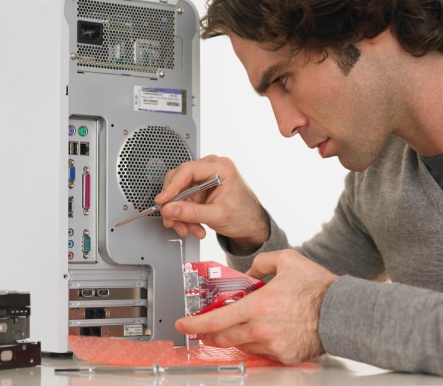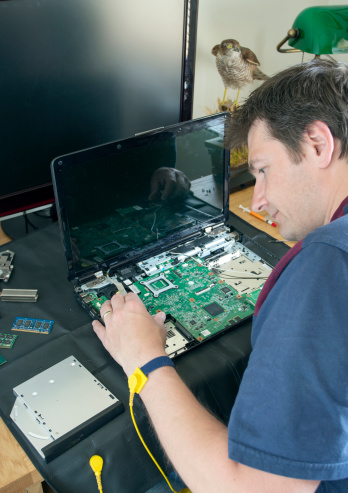 It happens to all of us at some point: we’re working quietly in front of our computer and suddenly it stops working. We try rebooting several times, reading online tutorials to solve our problem, but we don’t find a quick solution. After several attempts and frustrations, we decide to call a technician who offers onsite computer diagnostic and repair service to help us find what the problem is and how to fix it. Ideally you would contact a technician or workshop of confidence, but if we’re going through this ordeal for the first time, how can we be sure that the person we contacted is really a professional computer repairman? These 12 tips may help you out:
It happens to all of us at some point: we’re working quietly in front of our computer and suddenly it stops working. We try rebooting several times, reading online tutorials to solve our problem, but we don’t find a quick solution. After several attempts and frustrations, we decide to call a technician who offers onsite computer diagnostic and repair service to help us find what the problem is and how to fix it. Ideally you would contact a technician or workshop of confidence, but if we’re going through this ordeal for the first time, how can we be sure that the person we contacted is really a professional computer repairman? These 12 tips may help you out:
1. Having spare parts on hand: It’s important that the technician visiting you brings a mixed selection of spare computer parts: power supplies, video cards, ram, etc. to test the computer. If the technician believes that a part of your computer may not be working correctly, all he has to do is remove it and test the computer with one of his own spares.
2. Linux Live CD or similar: a Live CD is very useful when repairing downed operating systems, because they allow us to explore the hard drive content. They also allow us to make backups, since most Linux Live CDs come with programs to copy files to an external media such as a CD, DVD or USB drive. The latest versions can even be run off of a USB memory stick.
3. Having a backup computer: it is important that the technician bring a backup computer for data backup such as a laptop or netbook.
4. That he asks to work on a table or some other flat surface made of wood or in the case that only a metal surface is available, that he come prepared with a rubber antistatic electricity mat; a proper workspace is needed to disassemble a computer safely.
 5. He must use an antistatic wrist strap: these wrist straps prevent our body’s static electricity from damaging the computer’s components. Also a good technician avoids touching any of the computer’s components directly with his fingers.
5. He must use an antistatic wrist strap: these wrist straps prevent our body’s static electricity from damaging the computer’s components. Also a good technician avoids touching any of the computer’s components directly with his fingers.
6. Asks for internet access or brings a mobile internet connection: most people don’t take care of their original CD of drivers that came with their computers, and it will be the technician’s job to find and download them.
7. Bringing devices that allow the loading of operating systems from old backup computers, such as floppy disks: it’s common for many users to have old computers (5 or more years), which is why it’s important that the technician bring his files on different medias: floppy disks, CDs, DVDs, USB memory sticks, etc.
8. A vacuum: plenty of PCs are dusty and need thorough cleaning. A small brush is very helpful, but there are areas where it wouldn’t enter very easily, which is why a vacuum will assist the technician in removing dust from those parts. In many cases, a thorough cleaning brings a computer “back to life”.
 9. Compressed air, or an air compressor: A vacuum is great at extracting dust, however, it may not always cut it. Compressed air can reach everywhere and more effectively dislodge dust where it may be statically bonded to heat sinks, fan blades, etc. inside power supplies or other places.
9. Compressed air, or an air compressor: A vacuum is great at extracting dust, however, it may not always cut it. Compressed air can reach everywhere and more effectively dislodge dust where it may be statically bonded to heat sinks, fan blades, etc. inside power supplies or other places.
10. A flashlight: Most cellphones can use their camera flash as a flashlight, however, using this too much will run the phone’s battery out quickly, and a good technician wouldn’t go around with an uncharged cellphone. A small LED flashlight will last longer, and it may even be more accessible and brighter than a cellphone for certain parts of a CPU.
11. Stickers with the logo of the technician’s workshop: these are very useful to guarantee the repair service. They are placed in key positions of the computer, sealing it; this allows the technician to ensure his work as long as the sealing stickers have not been broken. Plenty of people find it easy to try fixing their own computer, only to later blame others for their faults.
12. Tools: the technician should bring a multimeter, a set of flat tip, cross tip, interchangeable tip screwdrivers, nose pliers, soldering iron, cutter, tool box with compartments for screws, microchip tweezers, soldering paste, thermal paste for heat sinks, etc.
Keep these tips printed and close to your computer. Remember to check them out the next time you need to call a service technician to solve a problem with your PC. Keep in mind that if you’re looking for a company that provides professional computer repair services at fair prices in Houston, don’t hesitate contacting 911-computer.com. We’ll visit and help you.
You can call us now and apply for one of our promotions: 15% discount on any repair service to seniors and students and 10% discounts on any repair service to first time customers. Call us now!







